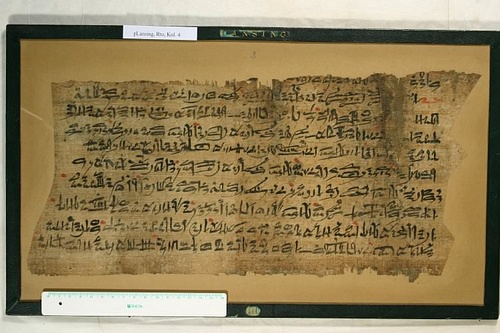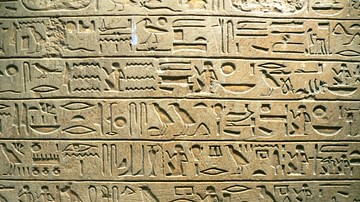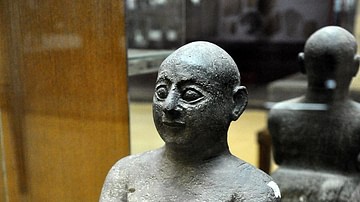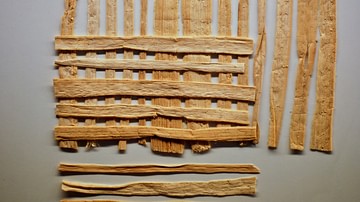The Papyrus Lansing is an ancient Egyptian document that dates to the reign of the Pharaoh Senusret III (also known as Sesostris III, and, arguably, the legendary Sesostris written of by Herodotus) the 5th ruler of the 12th Dynasty of Egypt from 1878-1839 BCE. It was written by the scribe Nebmare-nakht to his younger apprentice Wenemdiamun and is a document which praises the profession of a scribe while denouncing other trades. More importantly, for a modern reader and, perhaps, an ancient one, the Papyrus Lansing also offers insight into the daily life of the ancient Egyptians. The document begins with the admonition “Apply yourself to this noble profession” and then goes on to describe unfavorably the different professions Egyptians may go into other than that of the scribe. Through these very biased descriptions one gets at least a glimpse of what it was like to live as a farmer, merchant or soldier in ancient Egypt. The papyrus is written from the bureaucrat's perspective, and it is due to its' highly subjective view on the various professions that one enjoys reading it today.
Many modern readers may not appreciate the conceited and self-serving way the Papyrus Lansing comes across. In today's world, bureaucrats and 'bureaucracy' have a negative connotation. Bureaucrats today are looked at as being intellectually lazy, blindly enforcing a hierarchy of rules without regards to personal situations. In ancient times the bureaucrat was seen in much the same way – as a position best suited for one lacking common sense who only gets in the way or holds up any personal plan or project - and the Papyrus Lansing exaggerates the hardships other professions had to endure in order to make the profession of scribe seem even more important and desirable than it was. While there is no doubt that the position of scribe provided an ancient Egyptian with an easier life than many other occupations, the job was hardly the `life of leisure' which the self-satisfied Nebmare-nahkt presents it as.
In fact, it is because of the egotism of the `voice' of the scribe in the work that one finds the Papyrus Lansing such an interesting and humorous read. Not only may one find it illuminating, but it is also funny and satirical in its self-importance and description of the shortcomings of the other trades. It tells the reader to, “Befriend the scroll, the palette. It pleases more than wine. Writing for him who knows it is better than all other professions. It pleases more than bread and beer”. It also goes on to compare the happiness a scribe feels to that a of a baby nursing from his mother.
According to the Papyrus Lansing, no other occupation compares to that of a scribe. The author abhors all forms of physical labor. He talks of the hardships of washing other people's clothes, being a merchant or a farmer. In all these occupations, he notes, that workers will often be tired from working too hard in the hot sun and “their odor is penetrating”. In fact, the bureaucrat states, if the student has any sense, he will study to be a scribe in order to be protected from the hard work he would otherwise have to endure. As a scribe, he would be clothed in the finest robes, own property and have slaves at his disposal and Nebmare-nakh continues saying, “If you have any sense, be a scribe. If you have learned about the peasant, you will not be able to be one. Take note of it.
Nebmare-nakh, the proud scribe, goes further on the details of joining the military. Although it may seem one may become rich or prosperous by being a soldier, the author states that, actually, the soldier has a better chance of dying before receiving any riches. The Papyrus Lansing goes on to describe the different scenarios involving the soldier, all of them ending in death, as in, “The enemy comes, surrounds him with missiles, and life recedes from him. He is told: `Quick, forward, valiant soldier! Win for yourself a good name!' He does not know what he is about. His body is weak, his legs fail him”. At the end of the section we are told, “Be a scribe! And be spared from soldiering!...You are safe from torments. Every man seeks to raise himself up. Take note of it!”.
Propaganda at its finest, one cannot help laughing at the egocentric ways of the scribe. The understanding and activism of a modern reader may perhaps despise the obvious inequality between the different occupations as the scribe presents them but the author's tone is so absurdly self-important and egotistical that it makes the Papyrus Lansing an extremely entertaining read. Besides the obvious importance of the document for the insight it provides on life and work in ancient Egypt, the scribe Nebmare-Nahkt's praise of the scribe reminds a modern reader that there is no fundamental difference between the people of the past and those of the present. Our own subjective views of what we do, our jobs, our careers, our goals, are reflected back to us in the words of the ancient scribe elevating his own profession at the expense of every other.
This article was written in collaboration with J. Mark





